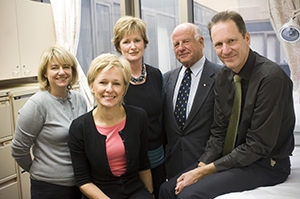Clinical Andrology
McLachlan group
Male factor infertility is a factor in half of all couples. The Clinical Andrology group investigates male reproductive health, including the evaluation and treatment of infertility, testosterone therapy, and the hormonal components of transgender medicine.

Research group
Overview
The Clinical Androlgoy group, led by Professor Rob McLachlan, undertakes male reproductive health translational research to understand the factors regulating sperm production and why it can fail. Their focus is on the diagnosis and management of male infertility including the genetic causes. New genetic causes of infertility are rapidly emerging, and given that half of male infertility remains unexplained, this approach has the potential to re-define the field of male reproductive health.
The Clinical Andrology group also studies the health of offspring conceived by severely infertile men using Assisted Reproductive Treatment (ART). A recent initiative is pursing endocrine strategies to stimulate spermatogenesis in idiopathic infertility (where the underlying cause is not known).
In androgen (male sex hormone) physiology, the team has made substantial contributions to understanding the biology and therapeutic impact of testosterone in older and obese men through clinical trials and the formulation of clinical guidelines. The Clincial Andrology group focus is androgen replacement for established androgen deficiency caused by testicular and pituitary disease, especially Klinefelter syndrome.
The team’s clinical service program in gender medicine focuses on the hormonal and medical oversight to achieve or maintain the desired phenotype.
In public service, the team provides support and content for Healthy Male’s professional and community education initiatives.
Diseases we research
Clinical Andrology Group areas of focus
- Genetic causes of male infertility: new knowledge leading to specific treatment or optimal use of ART procedures
- Medical management of idiopathic male infertility
- The health of the ART-conceived offspring of severely infertile men
- Testosterone in older and obese men, and men with androgen deficiency due to testicular [esp Klinefelter syndrome] and pituitary disease.
- Endocrine care of transgender individuals
Research Group Head | Professor Robert McLachlan AM
Male fertility issues are responsible for half of all cases of infertility and assisted reproductive treatment (ART). However, the underlying cause is usually not known. I investigate the origin and development of male infertility with the goal of identifying targeted treatments to alleviate the huge personal and societal burden.

News from the lab
Collaborators

Publication highlights






